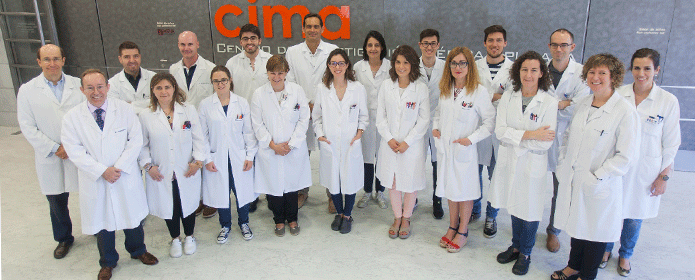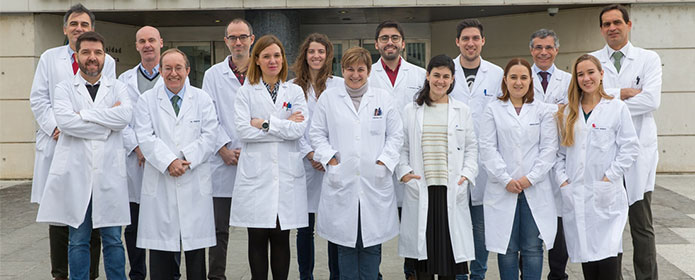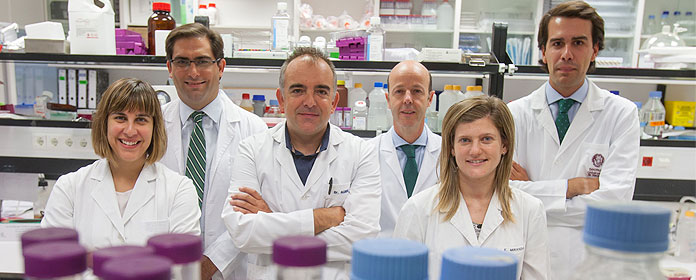A protein group financial aid to predict the risk of relapse in lung cancer patients
Two studies from Cima and Clínica Universidad de Navarra confirm that the detection of these molecules guides a more personalized treatment.

Lung cancer is the most frequent tumor in the world subject . Specifically, around 30,000 new cases are detected in Spain each year. However, less than 20% of lung cancer patients are diagnosed in the early stages, when they can be treated by surgery. Moreover, after surgery, a percentage of these patients, even those in the earliest stages, may relapse.
To date, there is no marker on the clinical internship to indicate which of the patients who have undergone operating room are at increased risk of recurrence over the years, and which are completely cured.
Scientists from the Cima and the Clínica Universidad de Navarra have identified a protein group that predicts the prognosis of patients with the two most common types of lung cancer: adenocarcinoma and squamous lung carcinoma. The results have been published in Thorax and Journal of Pathology, international reference letter journals in the field of respiratory medicine and pathology, respectively.
The researchers analyzed tumor samples from 239 patients with adenocarcinoma and 318 with squamous carcinoma, from the Clínica Universidad de Navarra, from MD Anderson in Houston (United States) and from the multicenter series of the CIBER de Enfermedades Respiratorias (CIBERES) and the essay international clinical NATCH. "The goal of this study is to detect those lung cancer patients who have a higher risk of relapse after surgery. To do this, we have assessed the expression of two groups of proteins (three in adenocarcinoma and five in squamous carcinoma)," explains Dr. Luis Montuenga, researcher senior of the Solid Tumors Program of the Cima University of Navarra and manager of group of the CIBER Cancer (CIBERONC).
The results obtained confirm that the high co-expression of these proteins determines a worse prognosis in lung cancer patients. According to the researcher of Cima, "these data are especially useful for guiding personalized follow-up, so that clinical specialists can consider initiating complementary chemotherapy treatment after surgery in surgical patients at higher risk, even if they are in early stages". Likewise, in adenocarcinoma samples, preliminary data suggests that these protein clusters could predict patients' response to chemotherapy. The researchers will now confirm the results by applying this "molecularsignature " in international multicenter series.
Automated analysisThe quantification system used in this study has the peculiarity that it uses a very simple method, which may accelerate its possible implementation in the clinical internship . "It is based on protein immunolocalization, a technique that is performed in virtually all Anatomy Pathology laboratories worldwide. Our work is now focused on finding tools to optimize the detection technology and implement automated analysis systems that allow robust quantification of these proteins," explains Dr. Montuenga.
This study was part of Elena Martínez-Terroba's doctoral thesis , co-directed by Dr. Mª José Pajares and Dr. Luis Montuenga, and has been funded, among other institutions, by the AECC Scientific Foundation. It is a work multidisciplinary in which researchers from Solid Tumors and Imaging at Cima collaborate, as well as specialists from Anatomy Pathology, Pneumology, Oncology and Thoracic Surgery at Clínica Universidad de Navarra, together with researchers from other Spanish and international centers.
reference letter bibliography:
- 5 protein-based signature for resectable lung squamous cell carcinoma improves the prognostic performance of the TNM staging.
Thorax. 2019 Apr;74(4):371-379. doi: 10.1136/thoraxjnl-2018-212194. Epub 2018 Nov 24. - A novel protein-based prognostic signature improves risk stratification to guide clinical management in early-stage lung adenocarcinoma patients.
J Pathol. 2018 Aug;245(4):421-432. doi: 10.1002/path.5096. Epub 2018 Jun 20.




